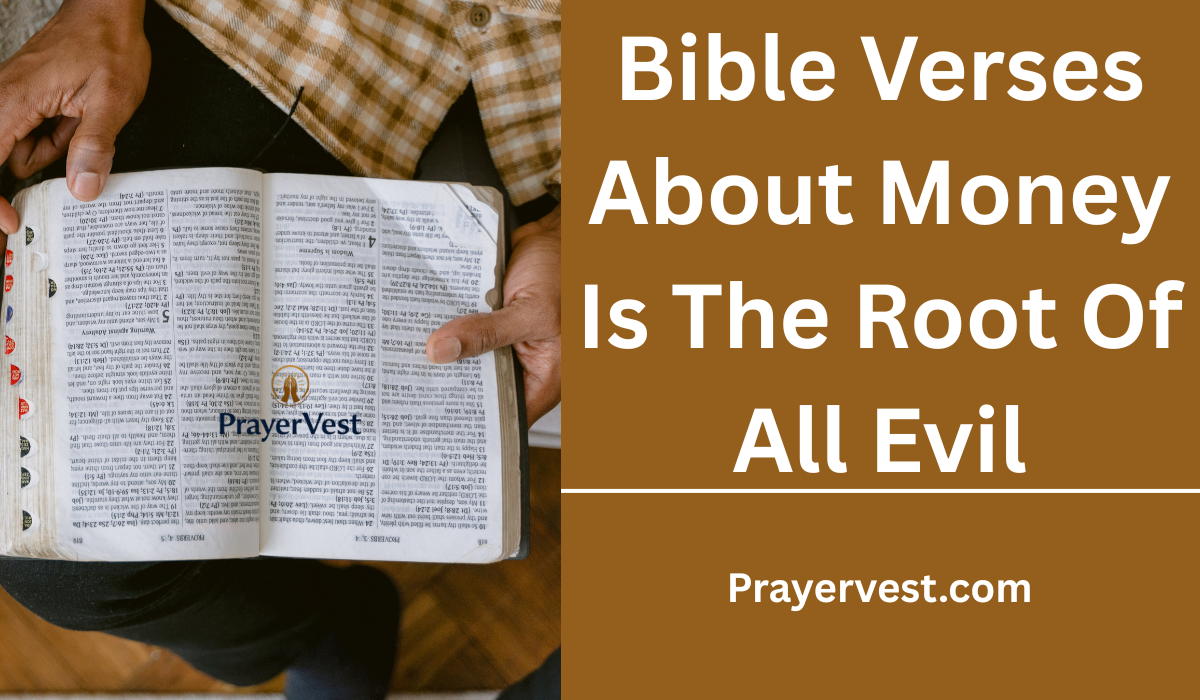Because of its profound impact on people’s hearts and communities, money is one of the most talked-about subjects in the Bible. Although the well-known statement “money is the root of all evil” frequently causes controversy, 1 Timothy 6:10 of the Bible states that “the love of money is the root of all evil.” This is an important distinction.
Money is neutral in and of itself; it can be used for either good or bad. Scripture forewarns against the idolatry, greed, and misguided affection that result when people put money before God, morality, or compassion.
From Judas betraying Jesus for thirty pieces of silver to Ananias and Sapphira lying about money in Acts, the Bible is filled with instances of how the chase of wealth has misled individuals. It is said that greed is a negative energy that leads to injustice, hardens hearts, and blinds individuals.
However, money is also portrayed as a resource that, when used properly, can benefit others, advance the goals of God’s kingdom, and support our families. The issue is not in having money, but rather in becoming possessed by it.


This compilation of texts will help you understand what the Bible actually teaches about wealth, greed, and contentment. We are taught to consider riches as a temporary gift rather than an ultimate aim when we consider these verses. A life focused on God’s knowledge, charity, and timeless values is the source of true wealth rather than material belongings. These verses push us to consider how we relate to money and to strive for a heart that prioritizes God.
40 Inspiring Bible Verses About Money Is The Root Of All Evil (2026)
1. 1 Timothy 6:10
“For the love of money is the root of all kinds of evil. Some people, eager for money, have wandered from the faith and pierced themselves with many griefs.”
This verse forms the foundation of the phrase often misquoted as “money is the root of all evil.” Paul clarifies that it is not money itself, but the *love of money*, that becomes destructive. When wealth takes priority over God, it corrupts motives, fuels greed, and distances people from faith. This verse highlights the spiritual danger of allowing money to rule the heart, showing how misplaced desires can bring ruin and sorrow.
2. Matthew 6:24
“No one can serve two masters. Either you will hate the one and love the other, or you will be devoted to the one and despise the other. You cannot serve both God and money.”
Jesus reminds us that divided loyalty is impossible. The pursuit of wealth can quickly become idolatry, competing with God for supremacy in our lives. When money becomes a master, it enslaves rather than blesses, distorting priorities and relationships. This verse challenges us to examine where our true allegiance lies and to choose eternal treasures over fleeting riches.
3. Hebrews 13:5
“Keep your lives free from the love of money and be content with what you have, because God has said, ‘Never will I leave you; never will I forsake you.’”
The antidote to greed is contentment. This verse assures believers that God’s presence is far more secure than any earthly possession. Chasing money often stems from fear of lack, but God promises provision and faithfulness. When our trust rests in Him, contentment flourishes, freeing us from the trap of material obsession.
4. Proverbs 11:28
“Those who trust in their riches will fall, but the righteous will thrive like a green leaf.”
This proverb contrasts the instability of wealth with the flourishing of righteousness. Riches are uncertain, subject to loss and decay, but righteousness rooted in God’s wisdom endures. Trusting in wealth leads to eventual downfall, while trusting in God produces growth, stability, and spiritual fruitfulness.
5. Ecclesiastes 5:10
“Whoever loves money never has enough; whoever loves wealth is never satisfied with their income. This too is meaningless.”
The pursuit of wealth is a bottomless pit—no matter how much is gained, it never satisfies. Solomon’s wisdom reveals the futility of greed, where desire for “more” becomes insatiable. True fulfillment is not found in accumulation but in reverence for God and gratitude for His blessings.
6. Luke 12:15
“Watch out! Be on your guard against all kinds of greed; life does not consist in an abundance of possessions.”
Jesus directly warns against greed, reminding us that true life is not measured by material accumulation. Greed distorts values, makes idols out of wealth, and blinds people to eternal priorities. This verse redirects focus from temporary possessions to eternal purpose, teaching that real life is found in God’s presence, not in earthly abundance.
7. Proverbs 22:7
“The rich rule over the poor, and the borrower is slave to the lender.”
This verse reveals the dangers of financial bondage. Wealth, when misused, can create power imbalances that enslave rather than liberate. Debt can place people in servitude to money rather than in freedom to serve God fully. It is a call to wise stewardship and a warning against dependence on riches.
8. Matthew 19:24
“Again I tell you, it is easier for a camel to go through the eye of a needle than for someone who is rich to enter the kingdom of God.”
Jesus uses vivid imagery to show how wealth can hinder spiritual surrender. Riches often make people self-reliant, proud, or unwilling to give up worldly security for eternal treasures. While not condemning wealth itself, this verse warns of the spiritual barrier riches can create when clung to too tightly.
9. Proverbs 28:22
“The stingy are eager to get rich and are unaware that poverty awaits them.”
Greed-driven haste to gain wealth leads to ruin. This proverb highlights how the desire to amass riches quickly blinds people to consequences, often leading to financial, moral, or spiritual poverty. True prosperity comes through integrity and God’s favor, not schemes or selfish ambition.
10. James 5:1-3
“Now listen, you rich people, weep and wail because of the misery that is coming on you. Your wealth has rotted, and moths have eaten your clothes. Your gold and silver are corroded. Their corrosion will testify against you and eat your flesh like fire. You have hoarded wealth in the last days.”
James delivers a sobering warning against hoarding riches at the expense of others. Wealth that is stockpiled selfishly rather than used for God’s purposes becomes a testimony against its owner. The temporary nature of riches contrasts with the eternal judgment awaiting those who misuse them. This passage stresses the futility of wealth when disconnected from righteousness.
11. Proverbs 15:27
“The greedy bring ruin to their households, but the one who hates bribes will live.”
This proverb emphasizes how greed is not only self-destructive but also harms families and communities. Corruption through bribes or dishonest gain destabilizes households, while integrity preserves life. Money gained wrongly often comes with hidden costs, leading to generational damage rather than blessing.
12. Luke 16:13
“No servant can serve two masters. Either he will hate the one and love the other, or he will be devoted to the one and despise the other. You cannot serve both God and money.”
Jesus restates the principle of divided loyalty: money and God cannot both sit on the throne of our hearts. The love of money enslaves, but the love of God liberates. This verse challenges us to decide who truly rules our lives, because one master always displaces the other.
13. Proverbs 13:11
“Dishonest money dwindles away, but whoever gathers money little by little makes it grow.”
This verse contrasts two approaches to wealth: dishonest shortcuts versus steady diligence. Ill-gotten wealth never lasts, while honest, consistent effort builds enduring stability. It is a reminder that quick greed-driven schemes often end in loss, but integrity secures blessings over time.
14. Colossians 3:5
“Put to death, therefore, whatever belongs to your earthly nature: sexual immorality, impurity, lust, evil desires and greed, which is idolatry.”
Paul identifies greed as idolatry — a form of worship that replaces God with wealth. Greed is not merely desire; it is a rival altar, where money becomes a false god. To walk in Christ, believers must actively put greed to death and choose devotion to God alone.
15. Mark 8:36
“What good is it for someone to gain the whole world, yet forfeit their soul?”
This piercing question exposes the futility of wealth apart from God. Even the greatest fortune is meaningless if it costs eternal life. Jesus reminds us that the soul is priceless, and no amount of money can redeem it. The pursuit of riches at the expense of spiritual health is the greatest loss imaginable.
16. Ecclesiastes 5:19
“Moreover, when God gives someone wealth and possessions, and the ability to enjoy them, to accept their lot and be happy in their toil—this is a gift of God.”
This verse reminds us that wealth itself is not evil; it becomes a blessing when received with gratitude and contentment. Enjoying what God provides without obsession keeps money in its proper place. True prosperity is marked not by hoarding, but by a heart that rejoices in God’s provision.
17. Proverbs 23:4-5
“Do not wear yourself out to get rich; do not trust your own cleverness. Cast but a glance at riches, and they are gone, for they will surely sprout wings and fly off to the sky like an eagle.”
The pursuit of wealth can be exhausting and fleeting. This proverb warns against placing ultimate trust in riches, which are unstable and temporary. Instead, focus on wisdom, diligence, and reliance on God, who alone provides lasting security.
18. 1 John 2:16
“For everything in the world—the lust of the flesh, the lust of the eyes, and the pride of life—comes not from the Father but from the world.”
Greed and the desire for wealth are worldly temptations that distract from God. John’s teaching reminds us that worldly desires, including excessive pursuit of money, oppose God’s purposes. Spiritual health requires rejecting worldly obsessions and seeking heavenly values.
19. Proverbs 21:20
“The wise store up choice food and olive oil, but fools gulp theirs down.”
Wise management of resources ensures security and prevents the ruin that comes from impulsive greed. This verse emphasizes prudence and stewardship over the reckless pursuit of wealth. Discipline in finances reflects wisdom in spiritual life as well.
20. Matthew 6:19-21
“Do not store up for yourselves treasures on earth, where moths and vermin destroy, and where thieves break in and steal. But store up for yourselves treasures in heaven, where moths and vermin do not destroy, and where thieves do not break in and steal. For where your treasure is, there your heart will be also.”
Jesus contrasts temporary wealth with eternal treasure. The heart follows what it values most, so a love of money directs life toward decay, whereas devotion to God brings everlasting reward. True security is spiritual, not material.
21. Proverbs 28:20
“A faithful person will be richly blessed, but one eager to get rich will not go unpunished.”
Faithfulness in life and work brings blessing, while a greedy rush for wealth often brings trouble. This proverb highlights the moral and spiritual risks of prioritizing money over integrity and devotion to God.
22. Luke 6:30-31
“Give to everyone who asks you, and if anyone takes what belongs to you, do not demand it back. Do to others as you would have them do to you.”
Generosity counters the love of money. By giving freely and acting with compassion, believers reflect God’s heart and resist the destructive grip of greed. Money becomes a tool for blessing rather than a source of evil.
23. Proverbs 19:1
“Better the poor whose walk is blameless than a fool whose lips are perverse.”
Integrity outweighs wealth. This proverb teaches that moral and spiritual character is far more valuable than riches. A simple, upright life avoids the pitfalls that accompany the pursuit of money at all costs.
24. Deuteronomy 8:18
“But remember the Lord your God, for it is he who gives you the ability to produce wealth, and so confirms his covenant, which he swore to your ancestors, as it is today.”
God is the ultimate source of provision. Wealth is a tool, not an idol. Remembering its divine origin keeps it in perspective and prevents it from becoming a destructive master.
25. Proverbs 11:4
“Wealth is worthless in the day of wrath, but righteousness delivers from death.”
No amount of money can shield us from God’s judgment. This verse reinforces that righteousness and moral integrity are eternal protections, whereas wealth is temporary and powerless in the ultimate matters of life and eternity.
26. 1 Timothy 6:17
“Command those who are rich in this present world not to be arrogant nor to put their hope in wealth, which is so uncertain, but to put their hope in God, who richly provides us with everything for our enjoyment.”
Even for the wealthy, hope must remain in God. Arrogance and trust in riches are dangerous, but recognizing God as the source of all blessings fosters gratitude, humility, and proper stewardship.
27. Proverbs 16:8
“Better a little with righteousness than much gain with injustice.”
This verse emphasizes the moral cost of greed. Even great wealth obtained through injustice is inferior to modest living with integrity. Money gained at the expense of righteousness ultimately corrupts and destroys.
28. Matthew 13:22
“The seed falling among the thorns refers to someone who hears the word, but the worries of this life and the deceitfulness of wealth choke the word, making it unfruitful.”
The love of money can suffocate spiritual growth. Jesus likens wealth’s deceit to choking thorns that prevent God’s word from bearing fruit in the heart. Prioritizing money over God diminishes spiritual potential.
29. Proverbs 10:22
“The blessing of the Lord brings wealth, without painful toil for it.”
When wealth comes from God’s blessing rather than greed or manipulation, it is free from spiritual corruption. This verse encourages dependence on divine provision rather than the destructive pursuit of riches through selfish means.
30. Ecclesiastes 7:12
“Wisdom is a shelter as money is a shelter, but the advantage of knowledge is this: Wisdom preserves those who have it.”
Money provides temporary security, but wisdom offers enduring protection. While financial resources may protect from immediate dangers, spiritual and practical wisdom ensure long-term preservation and moral guidance.
31. Proverbs 14:23
“All hard work brings a profit, but mere talk leads only to poverty.”
This verse emphasizes the value of consistent effort over empty ambition. While the love of money can tempt people to seek shortcuts or pursue wealth through unethical means, diligent work produces lasting results. True prosperity arises from integrity, planning, and persistence, highlighting that wealth earned honestly is stable and honorable.
32. Proverbs 28:25
“The greedy stir up conflict, but those who trust in the Lord will prosper.”
Greed does not affect only the individual; it often leads to quarrels, rivalry, and disruption in families and communities. In contrast, reliance on God fosters stability, peace, and sustainable prosperity. The verse teaches that spiritual and social harmony is compromised when wealth becomes an obsession, and that true success comes from trusting in divine guidance.
33. Ecclesiastes 5:12
“The sleep of a laborer is sweet, whether they eat little or much, but the abundance of the rich permits them no sleep.”
Wealth may bring comfort, but excessive attachment to money often results in stress, worry, and insomnia. This verse contrasts the contentment of someone who works diligently and lives within their means with the restlessness caused by greed and obsession with material accumulation.
34. Proverbs 22:1
“A good name is more desirable than great riches; to be esteemed is better than silver or gold.”
Character, integrity, and reputation are far more valuable than any sum of money. The pursuit of wealth at the expense of morality can damage a person’s name and relationships. This proverb stresses that virtuous living and ethical behavior provide lasting rewards that surpass the temporary benefits of riches.
35. Luke 14:28
“Suppose one of you wants to build a tower. Won’t you first sit down and estimate the cost to see if you have enough to complete it?”
Planning and foresight are essential in managing resources. Greed often drives people to make impulsive decisions, but careful calculation and preparation ensure stability and successful outcomes. Jesus uses this illustration to highlight the importance of wisdom and discernment in financial and personal matters.
36. Matthew 6:33
“But seek first his kingdom and his righteousness, and all these things will be given to you as well.”
God calls believers to prioritize spiritual pursuits over the pursuit of wealth. When God’s kingdom is first in our lives, material needs are provided appropriately, and the heart is protected from the corrupting influence of greed. This verse emphasizes trust in divine provision over reliance on money.
37. Proverbs 3:9-10
“Honor the Lord with your wealth, with the firstfruits of all your crops; then your barns will be filled to overflowing, and your vats will brim over with new wine.”
Wealth is intended to be a tool for honoring God. Proper stewardship, including giving and generosity, allows possessions to serve a divine purpose, while greed isolates and hoards resources. This proverb demonstrates that blessing comes from aligning material wealth with spiritual obedience.
38. Proverbs 23:17-18
“Do not let your heart envy sinners, but always be zealous for the fear of the Lord. There is surely a future hope for you, and your hope will not be cut off.”
Envy of the wealthy can lead to covetousness and moral compromise. This verse emphasizes the importance of contentment, trust in God’s provision, and commitment to righteousness over the allure of worldly riches. It reminds believers that ultimate security comes from faithfulness rather than comparison.
39. 1 Chronicles 29:12
“Wealth and honor come from you; you are the ruler of all things. In your hands are strength and power to exalt and give strength to all.”
This verse affirms that all riches and power ultimately belong to God. When money is treated as independent of divine authority, it becomes a source of pride and temptation. Recognizing God as the ultimate provider fosters humility, responsible stewardship, and proper perspective regarding material possessions.
40. Psalm 62:10
“Do not trust in extortion or put vain hope in stolen goods; though your riches increase, do not set your heart on them.”
Even abundant wealth cannot replace trust in God. This verse warns against putting hope or identity in material possessions and stresses the danger of allowing riches to dominate the heart. True stability and security come from reliance on God, not on money.
Conclusion
Ultimately, the Bible clarifies that the love of money is what causes devastation, not money per se. When money takes control of us, it breeds pride, greed, dishonesty, and even strained relationships. Scripture constantly cautions against putting our faith in wealth but rather encourages us to use it to further God’s kingdom and help others. We can align ourselves with God’s will and guard our hearts from idolatry by learning to hold money loosely.
Godliness, contentment, and a giving nature are the foundations of true wealth. The passages we have studied serve as a reminder that true fulfillment can only be found in Christ and cannot be bought with worldly goods. We are invited into a life of freedom, thankfulness, and unending riches when we resist the pull of greed. Happiness, tranquility, and spiritual success can be attained by choosing God over gold.






